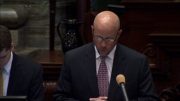In December and January, Spotify was hit with back-to-back lawsuits from David Lowery and Melissa Ferrick — both professors and artists — who sought class action certification over royalties they allege have gone unpaid to songwriters by the world’s largest streaming service. Lowery sought $150 million in damages in his suit, while Ferrick sought $200 million.
Those suits were essentially the same in purpose and aim, and now Judge Beverly Reid O’Connell of the Central District of California has granted a motion for them to be consolidated. Spotify will, the Judge writes, shortly file a motion to dismiss and/or to move the case to New York.
At the time of Lowery’s filing, Spotify said of the suit that “the data necessary to confirm the appropriate rights holders is often missing, wrong, or incomplete. When rights holders are not immediately clear, we set aside the royalties we owe until we are able to confirm their identities. We are working closely with the National Music Publishers Association [NMPA] to find the best way to correctly pay the royalties we have set aside and we are investing in the resources and technical expertise to build a comprehensive publishing administration system to solve this problem for good.”
Not long after that statement, Spotify and the NMPA reached a $30 million settlement over those “black boxed” royalties. “Spotify is larded with unlicensed tracks. And it still will be, even after the NMPA settlement. It is an infringement machine. What investors in Spotify own is a copyright infringement machine. My understanding is that the only ways to get rid of all the infringement is to go the class action route,” Lowery told Billboard after filing his suit.
A separate motion filed by Lowery sought to have the communications between the NMPA, Spotify and those eligible to take part in that $30 million settlement released to him, that argument being that the private communications could be misleading to potential members of Lowery — and now Ferrick’s — class action suit, accusing the two of “‘intent to threaten to influence the choice of remedies’ of prospective class members.” Lowery also argued that the settlement was reached through illegal communications between Spotify and the NMPA. On the first, Judge O’Connell found “no justification on this record” that suggests inappropriate or misleading communications with those eligible for the NMPA settlement. On the latter point, Judge O’Connell writes that she “cannot make any specific findings of abusive or unethical conduct based on the record here. The content of the agreement between Spotify and the NMPA itself does not warrant corrective action.”
Now, as mentioned, we await Spotify’s motion to dismiss.
Source: www.billboard.com




